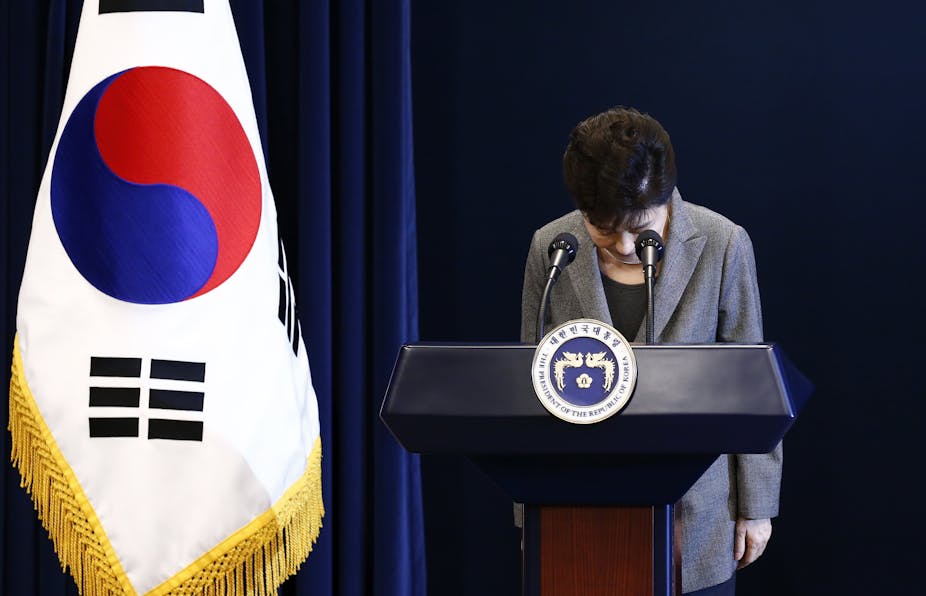Until its president, Park Geun-hye, was impeached over alleged corruption and cronyism, South Korea seemed like a relatively virtuous country as far as corruption goes.
In the Corruption Perceptions Index 2015 the country is ranked 37th among 167 countries, with a score of 56 on a scale of zero (highly corrupt) to 100 (very clean). In March 2008, it ratified the United Nations Convention against Corruption, which requires adhering countries to criminalise corruption and establish adequate measures to prevent such an illicit phenomenon. It’s also a member of the OECD Anti-bribery Convention, which establishes legally binding standards to outlaw the bribery of foreign public officials in international business transactions.
But then came the Park scandal, which outraged South Koreans and saw hundreds of thousands take to the streets in protest.
Specifically, Park stands accused of allowing her confidante Choi Soon-sil to exploit their relationship to interfere in state affairs and coerce business into donating large sums to foundations under her control. Parliament eventually voted to impeach Park with more than two-thirds of MPs in favour.
This is an epochal political scandal by South Korean standards, but its ramifications are much more global than that. The defenestration of an elected G20 president because of corruption charges is a chance to reignite the global debate on corruption and how to deal with it.
Quid-pro-quo
The Park affair appears to be a case of the most common type of corruption: the misuse of power in order to obtain something of value for a private interest. And while no sector of society is immune to corruption, this criminal phenomenon is particularly endemic in politics.
Every country, regardless of political tradition, culture or socio-economic status, has seen official bribery, misappropriation of public funds and misuse of public functions. (As Lord Acton famously put it in the late 19th century: “Power tends to corrupt and absolute power corrupts absolutely”.) And of all the forms corruption takes, this is one of the most difficult to eradicate.
Quid-pro-quo political corruption is a means of channelling personal influence and getting advantages from it. And because it mainly affects a country’s dominant class, it has a way of engulfing people with enough power to tackle it. This also explains why the most effective legal instruments adopted at both the domestic and international level have focused their power on the act of bribing foreign public officials, not domestic officials.

The Park scandal also reveals that despite its sterling political progress over the decades, South Korea is still in the grip of a corrupt political and industrial elite. Park is after all a political blueblood, daughter of former president Park Chung-hee – the military strongman and controversial leader who took power in a coup.
The sort of cronyism Park has come to embody is a worldwide feature of politics, and it has left electorates all over the democratic world deeply disillusioned with their leaders. Combined with all the other problems eating away at democratic legitimacy, official corruption wears down voters’ resistance to populism of the sort that saw Donald Trump win the US election, or the UK vote to leave the EU.
All hands on deck
There’s another, more left-field lesson: this episode should put an end to the surprisingly commonplace idea that women are intrinsically less corrupt than men.
This sounds like a strangely arbitrary assumption, but it is pervasive enough to be sometimes explicitly cited as a basis for policy. Mexico’s new anti-corruption efforts have seen hundreds of women hired to take charge of sanctioning traffic violations because men are thought to be too susceptible to bribes.
Now, it’s true that corruption is far from gender-blind in every sense. As Transparency International recently pointed out, patriarchal societies and economies make women more vulnerable than men to the impact of corruption, which limits their chances to get involved in politics, earn and save money, and use public services. The sight of more women taking power in public life is often a sign that a society is tending towards transparency and fairness. But the Park scandal should disabuse us of the strange notion that women are intrinsically less corruption-prone than men.
If a state suffers from systemic corruption, anyone elevated to power there can easily be enmeshed in corrupt activities regardless of their age or gender. To fight corruption effectively, we have to change prevailing cultures of elistism and clientalism. The public, private and philanthropic sectors alike have to be cleared of appointees who did not obtain their roles on merit.
This must be anti-corruption authorities’ primary aim. And if it sounds incredibly difficult, that might be because it demands the efforts of the same political class that benefits from the problem it is trying to solve.

